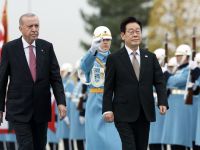US warplanes reportedly dropped cluster bombs on Taliban frontlines for the first time Thursday as officials in Washington began preparing Americans for a long, hard and potentially messy war.
With few signs that the militia is near to capitulating, US planes struck frontlines north of Kabul and south of the key northern town of Mazar-i-Sharif for a fifth day.
A Taliban official, who described the overnight raids as "intense", said the planes had dropped cluster bombs on Taliban positions. The fist-sized anti-personnel and armour-penetrating explosives are designed to scatter across a wide area.
Their use has already been reported in attacks near the western city of Herat by the United Nations but it was the first report of them being dropped on the frontlines.
The Diana, Princess of Wales Memorial Fund urged the US and British governments to stop using cluster bombs, saying they posed a serious long-term threat to civilians similar to that of landmines.
As the campaign entered its 19th day, US and British officials appeared to be preparing the public for a drawn-out conflict.
"We're resolved. We are strong. We're determined. We're patient. And this nation is going to do whatever it takes," President George W. Bush said.
Britain's top military officer told the Financial Times that the war would continue in spite of the onset of winter and the Muslim fasting month of Ramadan which begins in mid-November.
"We're not aware Ramadan stops terrorists claiming to be good Muslims from conducting terrorist raids," Admiral Sir Michael Boyce, chief of the defence staff, told the Financial Times.
Such warnings have ominous implications for the beleaguered population of a country which has already suffered more than 20 years of war and three years of drought.
The UN said Wednesday that 70 percent of residents of Herat, Kandahar and Jalalabad, an estimated one million people, had fled their homes.
"They are coming here," refugee Abdul Hameel told AFP at an emergency camp near the Chaman border post in southwest Pakistan. "It will only take a few days but they are coming."
More than 60,000 refugees have crossed into Pakistan since the September 11 attacks on New York and Washington. The UN High Commissioner for Refugees is bracing for that total to multiply by five in the next few weeks and fears 1.5 million people could flee Afghanistan in the longer term.
More than 2,000 Afghan refugees arrived overnight and early Thursday at the border with Iran and were moved into the Makaki refugee camp in Afghan territory, the UNHCR said.
At least a million people are already displaced inside the country and more than three million rely on international food aid, the delivery of which has been hampered by the air strikes.
The lucky few who have managed to trek across desert and mountainous terrain to the Pakistani border have recounted tales of their home towns being reduced to rubble-strewn ghost towns by the bombing.
The refugees' accounts have also added to mounting evidence that the US-led campaign has left scores of civilians dead, an issue that is causing disquiet in neighbouring Pakistan and elsewhere and has triggered violent protests across the Islamic world.
Two villages close to Herat were bombed overnight, leaving a total of 37 people dead, according to the Taliban and the Afghan Islamic Press (AIP). The Taliban also claimed a US bomb had destroyed a large, packed bus in Kandahar. None of the incidents could be confirmed independently.
About 1,000 exiled Afghan leaders meeting in the Pakistani border city of Peshawar issued a formal demand for an end to the US-led bombing of the Taliban and a ceasefire in Afghanistan's civil war.
Taliban Education Minister Amir Khan Muttaqi appealed to the 57-member Organisation of the Islamic Conference to dispatch a delegation to witness the damage and casualties caused by US bombing.
"They are carrying out barbaric and indiscriminate bombing of residential areas, mosques and hospitals," Muttaqi said.
US efforts to eliminate Taliban troops have been made harder by them moving into urban areas. Although US planes have been buzzing over Kabul repeatedly, bombing has been light, apparently indicating targeting problems.
A senior Pentagon official, Rear Admiral John Stufflebeem, said US forces would find ways to hit the militia's troops without threatening locals.
"But it is extremely difficult," he said. "Very few people know of any more difficult kind of warfare, so it's going to be very methodical. It's going to take time."
At least 25 civilians have been killed in Kabul alone by US bombs which either missed their targets or were aimed at civilian buildings in error. Bombing has been much more intense in Kandahar but casualties there are impossible to gauge.
The Taliban claims more than 1,000 civilians have died since air strikes began on October 7.
Advances by the anti-Taliban opposition in northern Afghanistan are crucial to hopes for swift results in the campaign to topple the militia, which has ruled most of the country since 1996.
The regime is under attack for refusing to hand over Osama bin Laden, the alleged mastermind of last month's devastating attacks on New York and Washington.
Despite the US bombing of Taliban frontlines, the opposition has claimed only minimal advances to the south of Mazar-i-Sharif. Opposition troops closer to Kabul admit they are not yet in a position to launch a ground attack against Taliban positions defending the capital -- Kabul, (AFP)
© 2001 Al Bawaba (www.albawaba.com)







